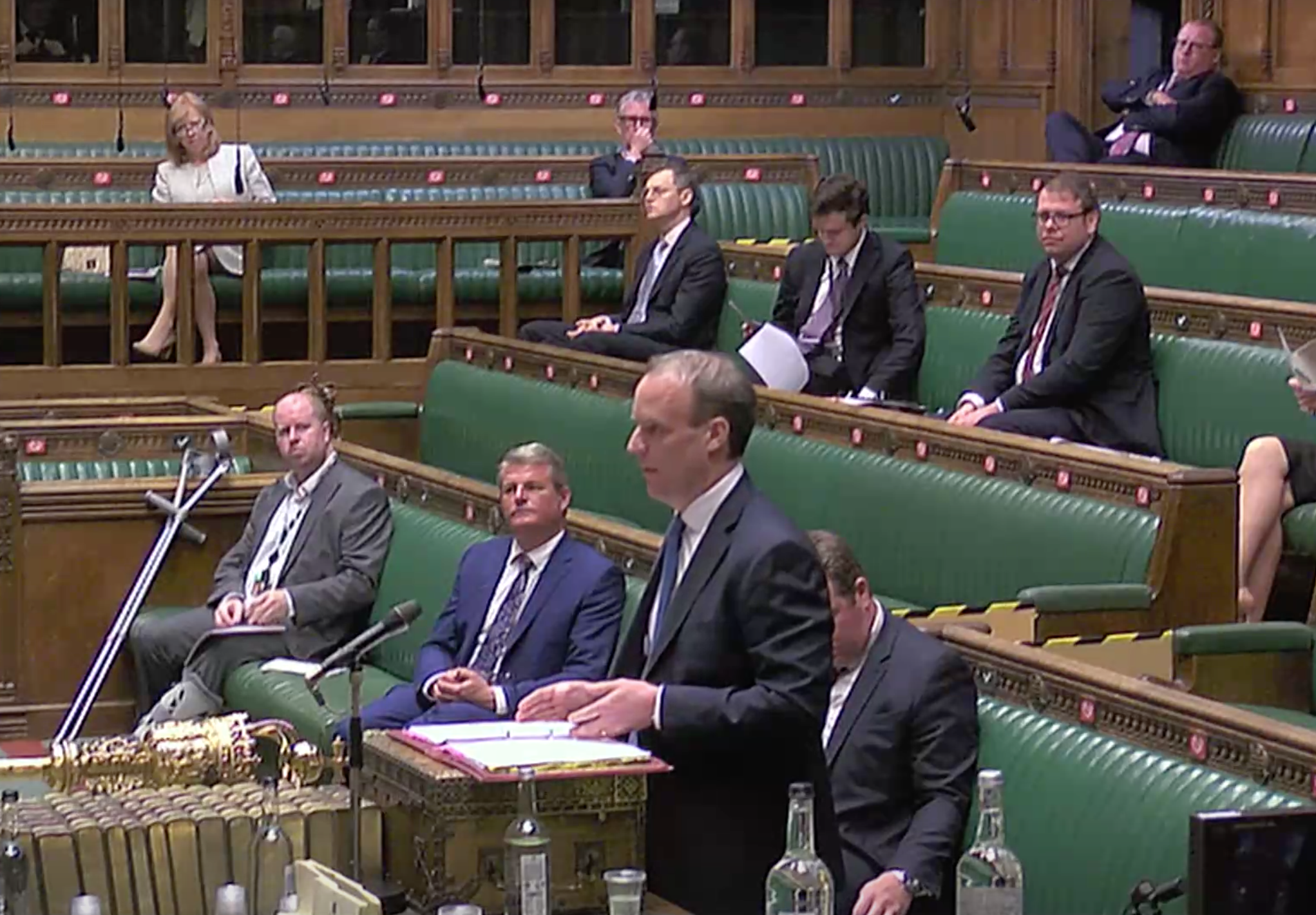Coronavirus: The void at the top of British government could cost lives
There are political and constitutional implications caused by the PM’s absence – and they matter now more than ever, writes Sean O'Grady


The mostly unwritten British constitution is a famously flexible affair, but it seems to be coming apart during this crisis. Until this week, parliament has been more or less absent for critical weeks, and in any case is finding adapting to remote working a novelty, if not a struggle. More serious than anything though, there is simply no provision for the incapacity, or partial incapacity as now, of the prime minister. There is, as former premier Tony Blair points out, a “void” in decision-making, both in constitutional and political terms.
Even in normal times this would be unsatisfactory and unworkable for anything more than a few days. At a moment such as this, it could cost lives.
Dominic Raab is clearly the “acting” prime minister. Yet there is no such position under law and even in the unwritten elements of the constitution. He was given the occasionally used title of first secretary of state, as well as foreign and commonwealth secretary, by Boris Johnson when he was appointed last July, establishing his formal position of precedence. When the crisis began, the prime minister further nominated Raab to deputise for him “as necessary” in relation to the crisis.
But Raab is not prime minister. That is still Johnson, and the appointment is binary: you are either PM, or not. Johnson is able to hold conversations with President Trump and the Queen, and communicates with colleagues. But what role he has in decision making is surprisingly fuzzy. It is also uncertain as to when he will return to work.
The problem is twofold, political and constitutional.
Politically, for all his virtues, Raab simply does not possess the kind of base or political seniority of the kind of figures who have been formally deputy prime minister, or de facto deputy in previous regimes, such as Nick Clegg in the David Cameron-led coalition, Michael Heseltine with John Major, or Willie Whitelaw for Margaret Thatcher. Raab came sixth in the Tory leadership contest last year, and simply does not have that status. He has been to his current duties appointed in a vague manner by Johnson.
Constitutionally, it could be argued that nominating an “acting” prime minister, and de facto prime minister is not properly in Johnson’s gift anyway. Arguably the cabinet or parliamentary Conservative party is the more legitimate forum for an acting premier to emerge from. Yet Johnson has preempted any such move. Raab thus lacks the explicit endorsement of his party, or the cabinet. It is ambiguous at best.
That might not matter so much if power wasn’t so concentrated so completely in Downing Street, and the government not so dominated by the personality of Johnson – but it has. Ministers say that all is well because we have “cabinet government”, but that is little more than a formality. In reality we have a presidential system – but currently with no president. It has long been the case.
Even in the high noon of New Labour, the No 10/Cabinet Office machine, led by such powerful figures as Blair, Jonathan Powell, Alastair Campbell and Peter Mandelson, had to share power with Gordon Brown’s Treasury. Under the Johnson-Dominic Cummings regime HM Treasury has been subordinated to No 10 (as was apparent when Sajid Javid resigned). No cabinet minister could possibly challenge Johnson’s authority after his near landslide election win last December.
Power has rarely been so centralised in peace time: yet the man who so enjoys it is convalescing, indefinitely.
You get the impression that some members of the cabinet might feel that they have a better claim on the role of acting PM than Raab, and resent him chairing cabinet meetings and taking prime minister’s questions. Certainly there’s a remittance to commit to any major changes in policy while the “boss is away”. Yet soon they will be unavoidable. How, exactly, and when to adjust the lockdown? How to solve the PPE crisis? Whether to seek or agree to an extension of the Brexit transition? How much to increase the national debt?
The other option is to bestow the title and full powers of the premiership on Raab, or some other perhaps more popular figure, such as Rishi Sunak, until Johnson gets back to the office. It would beg all manner of questions as to how that person would be selected, and would require the cooperation of Buckingham Palace. The Queen will need to stay out of controversy if the time comes for her to “send for” a temporary replacement for Johnson, albeit one with full powers. It would hark back to the practice that prevailed before the 1960s, before the Conservatives decided to elect their leaders. That, though might be preferable to the current paralysis. A bad PM, it might be said, is better than no PM.
Join our commenting forum
Join thought-provoking conversations, follow other Independent readers and see their replies
Comments